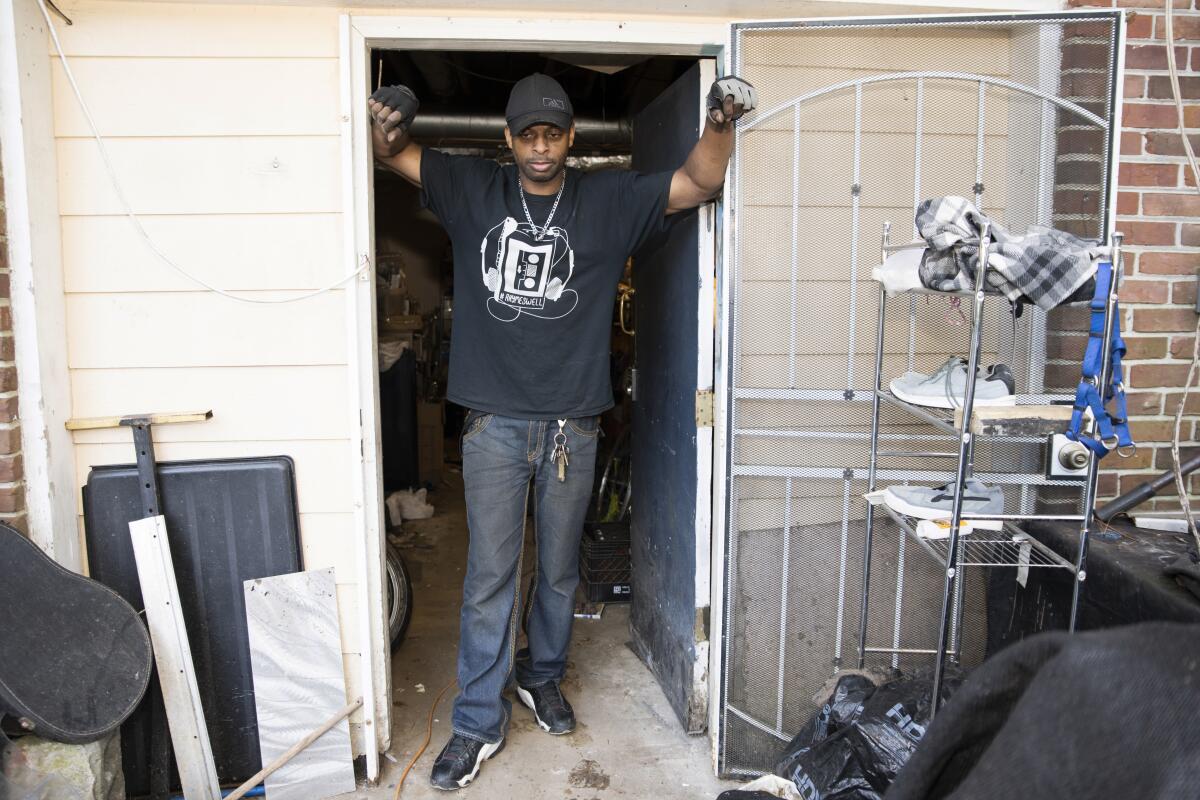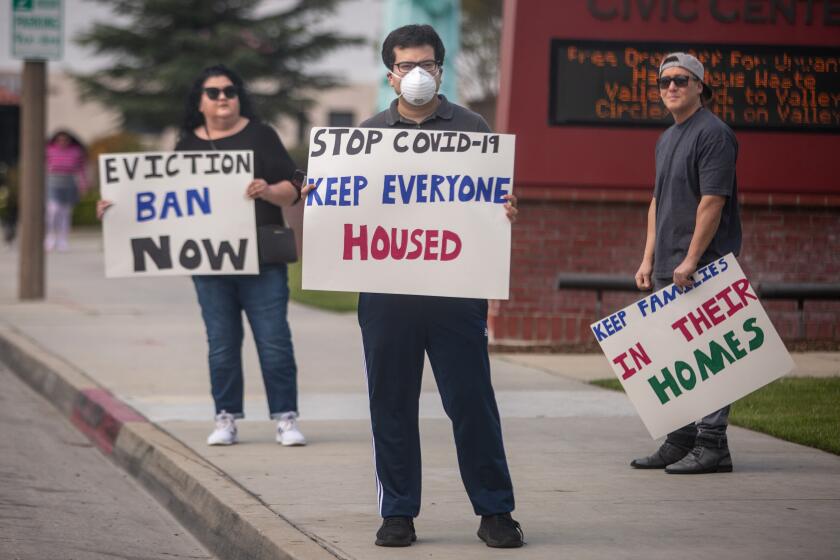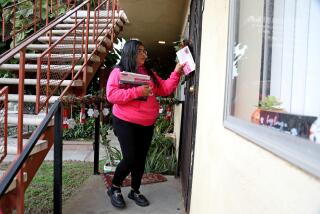Landlords finding ways to evict tenants after getting federal rental aid

- Share via
A day before she was due to be evicted in November from her Atlanta home, Shanelle King heard that she had been awarded about $15,000 in rental assistance. She could breathe again.
But then the 43-year-old hairdresser got a letter last month from her landlord saying the company was canceling her lease in March — seven months early — without any explanation.
“I’m really [angry] about it. I thought I would be comfortable again back in my home,” said King, whose work dried up during the pandemic and who now worries about finding another apartment she can afford. “Here I am back up against the wall with nowhere to stay. I don’t know what I am going to do.”
Although the $46.5-billion Emergency Rental Assistance Program has paid out tens of billions of dollars to help avert an eviction crisis, some tenants who received help are finding themselves threatened with eviction again — sometimes days after getting federal help. Many are finding it nearly impossible to find another affordable place.
“It is a Band-Aid. It was never envisioned as anything more than a Band-Aid,” Erin Willoughby, director of the Clayton Housing Legal Resource Center Atlanta, said of the program.
“It’s not solving the underlying problem, which is a lack of affordable housing. People are on the hook for rents they cannot afford to pay,” she said. “Simply finding something cheaper is not an option because there is not anything cheaper. People have to be housed somewhere.”
The National Housing Law Project, in a survey last fall of nearly 120 legal aid attorneys and civil rights advocates, found that 86% of respondents reported cases in which landlords either refused to take assistance or accepted the money and still moved to evict tenants. The survey also found a significant increase in cases of landlords lying in court to evict tenants and illegally locking them out.
“A number of issues could be described as issues related to landlord fraud ... and a set of problems I would describe as loopholes within the ... program that made it less effective to accomplish the goal,” said Natalie N. Maxwell, a senior attorney with the group.
Angelenos who lost income in the pandemic can apply again for help paying the rent debt they’ve accrued. Landlords can apply too.
National Apartment Assn. President and CEO Bob Pinnegar said the survey was not based on facts, adding that its members are doing everything they can to keep tenants in their homes, including lobbying to get rental assistance out faster.
“Skewed surveys aren’t reflective of the entire situation. By and large the rental housing industry has gone to great lengths to support residents, including when it comes to rental assistance and adherence to laws and regulations,” Pinnegar said in a statement.
Legal aid attorneys interviewed across the country confirmed they are seeing a steady increase in cases where tenants were approved for rental help and still faced eviction. These include the mother of a newborn and two other children in Florida who received rental assistance but was ordered evicted after the landlord refused to take the money. Another Florida landlord lied in court that she hadn’t received the money in a bid to push through an eviction.
There have also been cases in Georgia and Texas where landlords who received assistance moved to end leases early, increased rents to unaffordable levels or found other reasons than nonpayment to evict someone, lawyers said.
“As it is right now, it doesn’t seem to be working as intended,” said Tori Tavormina, an eviction prevention specialist with Texas Housers. “It feels much more like it’s a program that is alleviating the pressure of the eviction crisis but not solving the underlying problems.”
District Court Judge Shera Grant, who handles housing cases in Birmingham, Ala., said she and her fellow judges have seen an uptick in cases of landlords getting assistance and returning to court a few weeks later after a tenant has fallen behind on rent to seek an eviction. So far they have prevented them — though she expects a spike in these kinds of cases going forward.
“It’s incumbent on the judges to make sure we are paying close attention to our eviction cases and making sure that the landlord is not having their cake and eating it too,” she said. “By the same token, we are not forcing landlords to take the money. There are some unfortunate circumstances where the tenant has to be evicted.”
In the case of King, she believes her landlord was retaliating for earlier complaints about mold and water leaks in her three-bedroom house. The company King was dealing with, NDI Maxim, which manages property for owners, said it “was not at liberty to share details of tenants’ status nor their payment records.”
Other cases are complicated by the length of the pandemic and conflicting accounts of landlord and tenant. And they often leave both parties feeling short- changed.
Despite his landlord getting more than $20,000 in rental assistance, Prince Beatty faces imminent eviction from his three-bedroom house in East Point, Ga.
After the money was approved, Beatty signed an agreement in court late last year to pay several thousand dollars more than he owed as a condition to remain housed.
He went back to the county for additional assistance to cover the balance but says he was denied. Unable to find warehouse work during the pandemic, the 47-year-old Navy veteran still can’t pay rent and is now $12,000 behind, in part due to his rent increasing from $1,250 a month to $2,000.
Beatty, who was told he would be evicted this month, said he wakes most mornings in a panic, wondering if this will be the day when marshals “come and disrespect my stuff and throw it in the street.”
His landlord, Monique Jones, said she tried to work with Beatty. But she said he violated the lease by subletting rooms to several other people and that the amount of rental assistance has not covered losses from months of unpaid rent that started before the pandemic.
“It was helpful but it did not address the underlying issue, which is his nonpayment of rent,” she said of the rental assistance. “That still remains and that is rightfully why I am proceeding. If I have a tenant who will pay rent and abides by the lease, I would not attempt to evict.”
Limits with rental assistance often come down to some states and localities failing to follow Treasury Department guidance calling for policies requiring landlords delay evictions after getting money. Although the program prevents landlords from evicting during the period covered by rental assistance, the Treasury Department can only encourage states to adopt policies that ban evictions up to three months afterward.
The National Low Income Housing Coalition found only 29 states and localities in 2021 had adopted policies that prohibit landlords who participate in the rental assistance program from evicting tenants for a period ranging from 30 days to 12 months. Six states — Arizona, Kentucky, Louisiana, New York, North Carolina and West Virginia — passed regulations, and several cities or counties in Texas and Maryland did.
Gene Sperling, who is tasked with overseeing implementation of President Biden’s $1.9-trillion coronavirus rescue package, said there were no data to suggest landlords evicting tenants after getting assistance is a “pervasive issue” but that it was “completely unacceptable.”
While it’s “not against the letter of the act, it’s against the spirit of it,” he said.
The coalition also said the program’s issues illustrate a larger problem.
“We are in the middle of a severe affordable housing crisis with gaping holes in our social safety net,” CEO Diane Yentel said. “We have a systemic power imbalance that favored landlords at the expense of low-income tenants. Emergency rental assistance and eviction moratoriums were a patch to those holes.”
More to Read
Sign up for Essential California
The most important California stories and recommendations in your inbox every morning.
You may occasionally receive promotional content from the Los Angeles Times.











